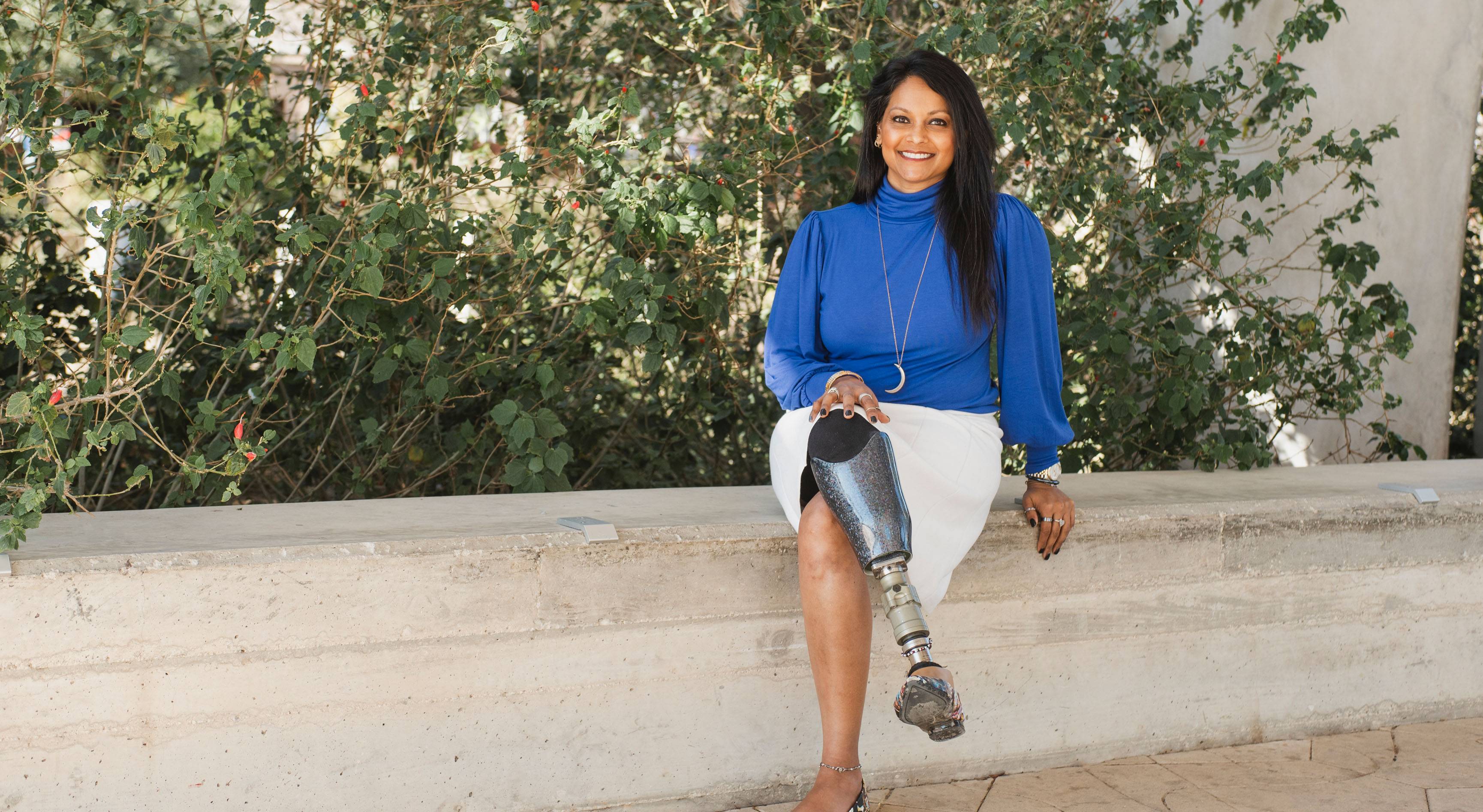
Amputee advocate Mona Patel finds the strength to change lives
By Edmond Ortiz
Many people have endured a life-altering or traumatic experience that becomes a turning point for something unexpected and positive.
For alumna Mona Patel (M.S.W. ’00), her life-changing moment happened at age 17. In 1990, Patel was walking to class at California Polytechnic State University when she was struck by a drunken driver. Patel’s right leg was pinned between the car and a railing and her foot was mangled.
Patel would go on to push through the physical and emotional pain to lead a regular life. Today, she is the founder and executive director of the San Antonio Amputee Foundation (SAAF), a role stemming from her advocacy for fellow amputees.
Her immediate worry following the accident was how she would encourage and support her traditional India-born parents. “Foremost, I knew I had to be strong for my parents,” the Los Angeles native recalls. The accident would also come to be an opportunity for independence. Patel’s parents had planned to arrange her marriage, but the injury made them fearful that potential suitors would view her as what she calls “damaged or less than.”
“There was a possibility there wouldn’t be a ‘good’ family for me to marry into, so my parents gave me permission to find my own husband, hoping that he’d still be of Indian descent,” she says.
Patel returned to school just months after the accident. Her doubts about leading a full life subsided, partly due to encounters with others. She talks about meeting a quadriplegic man who sold jewelry. The man controlled his motorized wheelchair with his mouth, and Patel says she was impressed with his perseverance and his trust in customers. “It put so much perspective in my heart and here I was upset about a painful limb, but I could still walk, drive, and feed myself,” she says. “I truly feel he was put there for me that day.”
Despite more than 20 surgeries and countless hours of physical rehabilitation over the next seven years, Patel went on to earn a master’s degree in psychology from Pepperdine University. By 1997, Patel married and moved to the San Antonio area.
Embarking upon her 21st surgery, she reflected on the quality of her life. “I was tired of the repeated visits to the operating rooms, cycles of physical therapy, limited endurance and mobility, and pain medication. I found myself at a crossroads: Was it finally time to amputate my leg in hopes of a better quality of life?” she says. She also wondered how she could cope with pregnancy and motherhood. Then she met a woman who raised four children following amputation. Patel says the woman had kept baby necessities at her bedside and this adaptability was encouraging.
That summer, Patel’s right leg was amputated below the knee. By the fall, she was on crutches and attending classes at Texas State. As part of her social work studies, Patel and her classmates did a group project that would give rise to the amputee foundation, a nonprofit that provides area amputees with peer support, information, education, case management, health and fitness programs, and social opportunities.
“I searched for an amputee support group to attend, to no avail. I vowed that once I got back on my feet, I’d start a support group,” she says.
She describes her time at Texas State as a positive experience. “The community was supportive, and so were the instructors. My classmates were great,” she says.
Patel has two teenage daughters, Anaya and Arianna. “I vividly remember Anaya as a 4-year-old asking me why ‘the other mommies have two legs, and you have one?’” Patel says. “I explained why, and she told me she loved my ‘robot leg.’”
The support group that became SAAF has long been active with about 60 members meeting monthly. They participate in yoga, adaptive boot camps, and athletic, social, volunteer, and fundraising events. In 2015, Patel joined other amputees in ascending Mount Kilimanjaro, Africa’s highest peak.
In 2017, Patel was honored as a CNN Hero. Through her philanthropic work, Patel encourages others to be positive and reminds them that only they can set their limits: “The only payback or paycheck I need is that they, in turn, pay it forward to others in need of their love and strength.” ✪
More Info: saamputeefoundation.org